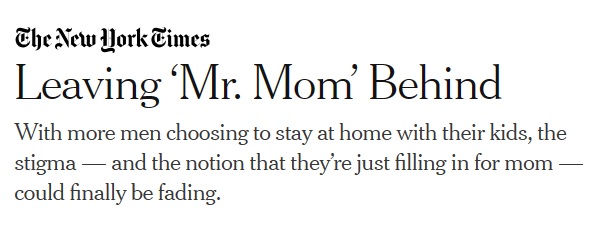Not long ago, a New York Times piece heralded the growth of stay-at-home dads. (Forget the fact that in recent years there hasn’t been printed – as far as we can tell – a story on the growth of work-outside-the-home moms.) The story discussed how, more and more, men are erasing stigmas and normalizing the fact that fathers do indeed stay at home to care for the family.
But clouded by its very message of normalization was the reference of a sexist movie title that detracted from an otherwise supportive piece.
A headline is intended to summarize a story and draw readers in. This one merely reinforced an old-fashioned, prejudiced trope.
It’s disappointing how anytime the topic of stay-at-home dads arise, it’s often accompanied by a reference to this highly sexist, badly outdated film – which is a shame because the movie is filled with more than a few likable and notable actors.
In a world of #MeToo, Quiet on Set, problematic racist movies, and notable social movements, writers, media and marketers would do well to stop referencing a movie that has aged poorly and does fathers no favors.
Stop talking about it, citing it and quoting it – except only in the sense of learning from its frustrating premise and, thus, offering better entertainment that builds up families and society.

